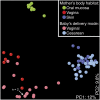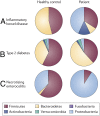The human microbiome and its potential importance to pediatrics
- PMID: 22473366
- PMCID: PMC3340594
- DOI: 10.1542/peds.2011-2736
The human microbiome and its potential importance to pediatrics
Abstract
The human body is home to more than 1 trillion microbes, with the gastrointestinal tract alone harboring a diverse array of commensal microbes that are believed to contribute to host nutrition, developmental regulation of intestinal angiogenesis, protection from pathogens, and development of the immune response. Recent advances in genome sequencing technologies and metagenomic analysis are providing a broader understanding of these resident microbes and highlighting differences between healthy and disease states. The aim of this review is to provide a detailed summary of current pediatric microbiome studies in the literature, in addition to highlighting recent findings and advancements in studies of the adult microbiome. This review also seeks to elucidate the development of, and factors that could lead to changes in, the composition and function of the human microbiome.
Figures



References
-
- Mazmanian SK, Liu CH, Tzianabos AO, Kasper DL. An immunomodulatory molecule of symbiotic bacteria directs maturation of the host immune system. Cell. 2005;122(1):107–118 - PubMed
-
- Hooper LV, Falk PG, Gordon JI. Analyzing the molecular foundations of commensalism in the mouse intestine. Curr Opin Microbiol. 2000;3(1):79–85 - PubMed
Publication types
MeSH terms
Substances
LinkOut - more resources
Full Text Sources
Other Literature Sources
Medical

